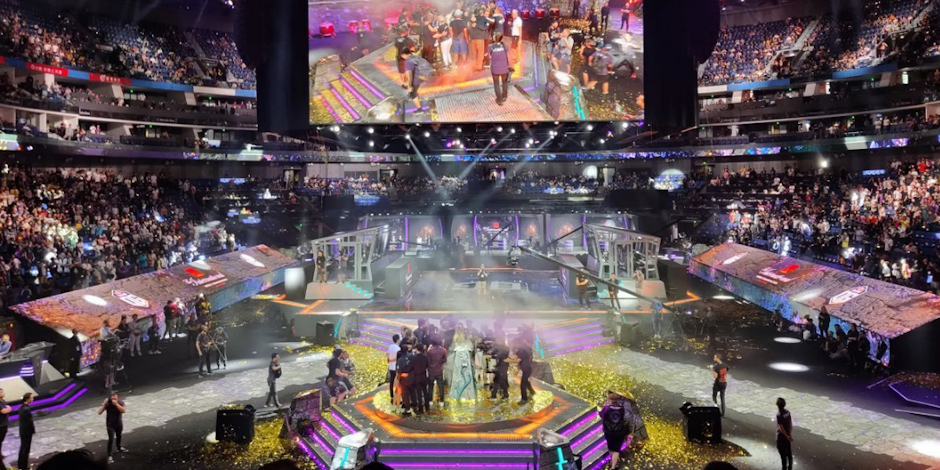Why advertisers should be excited about the growth of esports
Figures from early 2020 show that gaming is bigger than the NFL, NBA, MLB, and the NHL combined, and the record-breaking $30 million prize pool for Dota 2: The International (a multiplayer online battle arena video game) was almost three times larger than that of either the Super Bowl or the Masters Tournament and this was all before the pandemic hit!

As traditional sports leagues came to a standstill in 2020, esports picked up the mantle. LCS (League of Legends Championship Series) Commissioner Chris Greeley said, "We had a peak viewership of somewhere over 550,000, which were our biggest numbers in four to five years."
Last May, the Verge reported that hours spent watching Twitch grew by 50% from March to April, and the platform saw a 120% increase in viewership year-over-year. In the midst of the pandemic during May 2020, the platform was up to 1.645 billion hours per month.
According to Statista, as parts of the world begin to emerge from the pandemic, esports isn’t going anywhere. They state that by 2024, there will be 577.2 million viewers of esports worldwide, a massive jump from the 435.9 million in 2020.
So, how did we get here?
Although esports is seen by many as a relatively new phenomenon, it has actually been around for over 40 years, with many seeing the 1980’s Space Invaders tournament as one of the most popular first-recorded competitive gaming events, where players (some 10,000 entrants) attempted to record the highest score. I sincerely recommend the Netflix show “High Score” for some very informative as well as amusing glances into the early days of competitive electronic sports.
As gaming devices became more powerful and more multiplayer games were introduced, esports tournaments became commonplace throughout the 90s, with games like Street Fighter, Quake III Arena, and Counter-Strike bringing players together from across the globe.
Throughout the early 2000s, esports continued to grow, and the release of LOL in 2009 set a new precedent for what the future had in store for esports tournaments. Over the past few years, with the improvement of gaming devices and the release of hugely popular multiplayer games, including Rocket League (2015), Overwatch (2016), Fortnite (2017), and Valorant (2020), the industry has grown to become a force to be reckoned with.
Where do advertisers fit into all this?
Some of the world’s biggest brands began collaborating with esports tournaments after PepsiCo’s US ice tea brand Brisk saw massive success from the Rocket League Championship Series in 2017. Shortly after, Mastercard signed a multi-year partnership with Riot Games, and Intel, a brand not traditionally associated with gaming, made history by sponsoring the Overwatch League.
Global brand investment in this area has grown enormously every year, with NewZoo reporting a massive jump from $279M in 2016 to $974M in 2020, and this year they expect this number to exceed 1B for the first time.
Previously, esports was reserved for large brands that have big budgets to spend on exclusive collaborations and sponsorships, but in-game advertising has changed all that.
New technologies, more powerful gaming devices, a flurry of new gamers, and the rise of ad-supported free-to-play MMOs have all helped in-game advertising become the preferred funding model for many game developers.
Now, in-game advertising is finding its footing in esports and is helping smaller brands and agencies get in front of fans around the world as they watch their favorite teams compete for glory.
In-game advertising allows brands and agencies to efficiently deliver dynamically personalized ads into games that compliment the e-sports experience, opening up this globally diverse audience to advertisers everywhere, no matter how big or small their ad budgets are.
How do esports compare to traditional sporting events?
The International Olympic Committee recently announced it was organizing a slate of five esports events to be staged ahead of the Summer Games this year in Tokyo. Helping spread even more awareness for the platform, and in turn, cementing it in more advertisers’ minds as a viable advertising alternative to regular sports.
Esports presents an opportunity for brands to reach hybrid audiences, made up of people from differing backgrounds, ages, genders, and locations. The beautiful thing about esports fans is that there is not one type of fan -- they come from all walks of life and every corner of the globe.
Another advantage is that marketers can live out their wildest advertising dreams in esports environments. Have you ever dreamt of seeing your brand plastered across a sports stadium, on the side of a Ferrari, or on your favorite players kit? Esports makes this possible for brands at a fraction of what it would cost them in the real world - however, the audience remains just as engaged and just as big.
In-game advertising in esports also offers advertisers highly valuable user data, segmentation, consumer proximity, and immersive experiences that provide clear visibility on their return on investment.
With this platform continuing to grow and evolve year over year at an extremely rapid rate and new fans springing up across the globe, advertisers need to develop an esports strategy to remain relevant for future generations of valuable and highly engaged consumers.
By Hendrik Menz, brand & agency sales director at Anzu.

